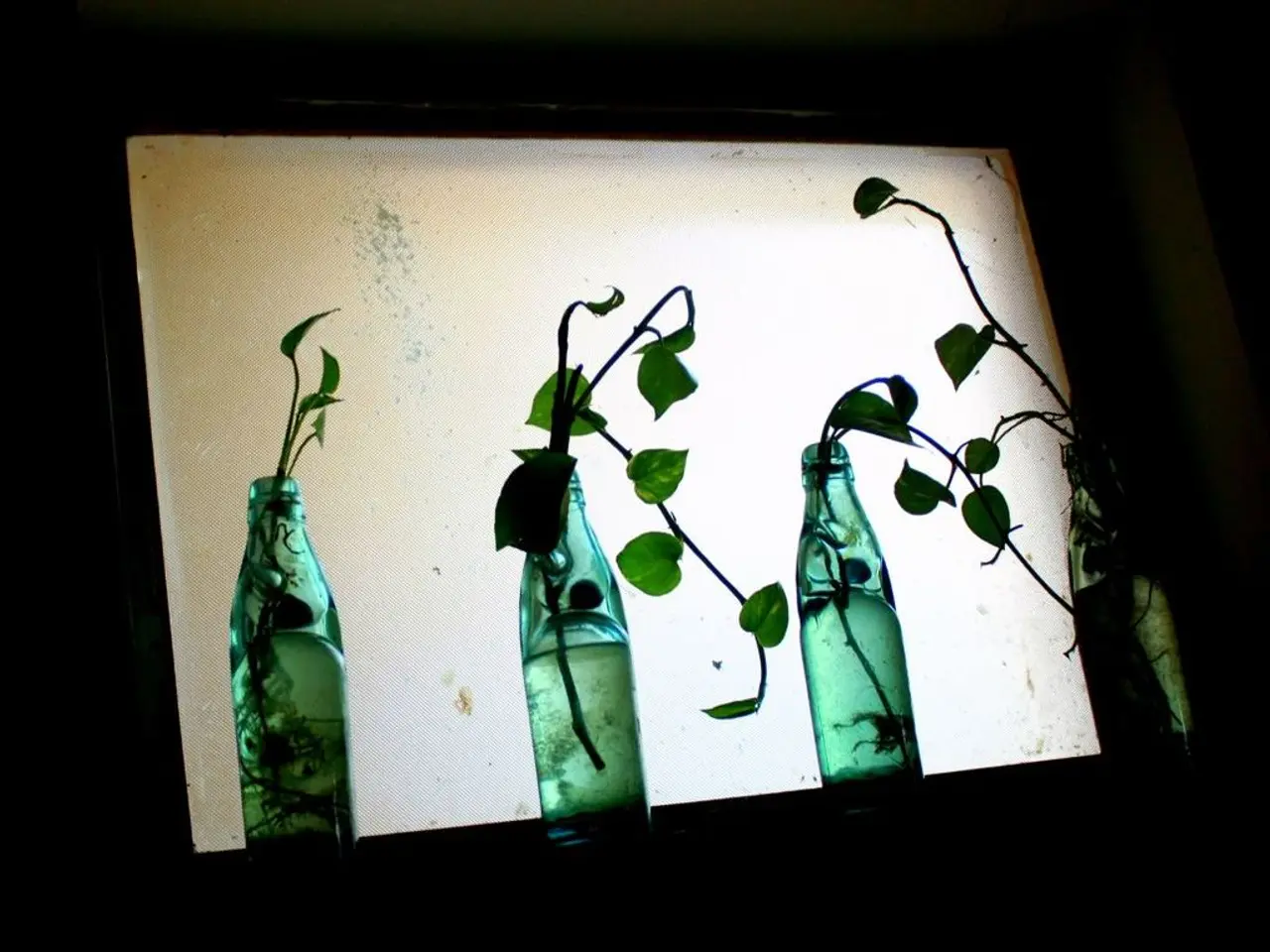Plastic alternatives made from grape waste biodegrade within 17 days, gaining strength
Grapevine Canes Transform into Eco-Friendly Packaging Films
Researchers at South Dakota State University (SDSU) have developed an innovative method to convert grapevine canes, a common agricultural byproduct, into a biodegradable alternative to single-use plastics. This groundbreaking discovery, published in the journal Sustainable Food Technology, could revolutionize the packaging industry and contribute significantly to addressing the global issue of plastic pollution.
The process involves drying, grinding, and chemically treating grapevine canes to extract cellulose. This cellulose residue is then solubilized and cast onto glass plates to create transparent, strong films that mimic plastic but biodegrade rapidly in soil. These films have a higher tensile strength than traditional plastic bags and decompose completely within 17 days in soil degradation trials.
This approach adds value to vineyard waste without consuming additional land or water resources, supporting a circular bioeconomy. The biodegradable film offers a sustainable alternative to petroleum-based single-use plastics, addressing major environmental issues linked to plastic waste and microplastic pollution.
Scientist Dr. Janaswamy, who has previously extracted cellulosic material from avocado peels, banana peels, alfalfa, switchgrass, and spent coffee grounds, was instrumental in suggesting the use of grapevine canes as a source of cellulose. He believes developing eco-friendly films from grapevine cellulose represents a practical path toward sustainability.
The scientists behind this innovation believe their work could pave the way for a biodegradable alternative to single-use plastics, particularly plastic bags. The plastic-like material developed by the scientists decomposes in less than three weeks, leaving no harmful residues. Moreover, grapevine canes are an abundant, cellulose-rich material available after harvest.
The scientists are optimistic about the films' outstanding potential for food packaging applications. Cellulose, the most abundant organic substance on the planet, is found predominantly in the cell walls of plants. It is naturally strong and rigid due to its tightly bound hydrogen bonds and long chains of glucose molecules.
This innovation uses underutilized grapevine prunings as a cellulose source for packaging films. If widely adopted, it could enhance waste management in the field and contribute to the global effort to combat plastic pollution. Dr. Janaswamy is currently working on developing a plastic-like bag that decomposes naturally in the environment, offering a promising, practical source for eco-friendly packaging films that combine the durability of plastic with rapid biodegradability, making them a viable substitute for single-use plastic items such as retail bags and food packaging.
[1] Fennell, A., et al. (2022). Grapevine cane cellulose films: A biodegradable alternative to single-use plastics. Sustainable Food Technology.
[2] South Dakota State University. (2022). Researchers create biodegradable plastic from grapevine canes. [Press release]
[3] National Geographic. (2018). The plastic bag problem: What you need to know. [Online article]
[4] United Nations Environment Programme. (2018). Single-use plastics: A roadmap for sustainability. [Report]
[5] World Wildlife Fund. (2019). Plastic waste and marine litter. [Online article]
- The groundbreaking discovery of converting grapevine canes into biodegradable packaging films by researchers at South Dakota State University could revolutionize the packaging industry, aligning with the global effort to combat plastic pollution.
- The scientists' invention uses the naturally strong and rigid cellulose found in grapevine canes, offering a sustainable alternative to petroleum-based single-use plastics, especially plastic bags, and making a practical path toward sustainability.
- In the home-and-garden realm, eco-friendly films derived from grapevine cellulose could contribute to sustainable lifestyle choices, eventually replacing single-use plastic items such as retail bags and food packaging.
- This environmental-science-driven innovation has the potential to transform our current plastic-heavy lifestyle, fostering a shift towards sustainable living and contributing significantly to the solution of the global plastic pollution issue.




